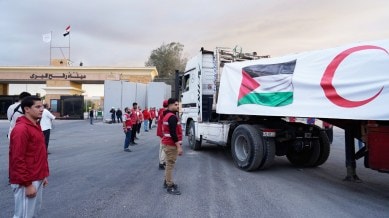Israel says Rafah crossing with Egypt to remain closed despite Palestinian embassy’s announcement of reopening
The Rafah crossing has been largely closed since May 2024, when Israeli forces seized the Gaza side during an extended military campaign. It briefly reopened in early 2025 during a short ceasefire but was shut again after hostilities resumed.

Israel has said the Rafah border crossing with Egypt will remain closed until further notice, contradicting an earlier announcement by the Palestinian Embassy in Cairo, which had declared plans to reopen the route on Monday.
Prime Minister Benjamin Netanyahu’s office said on Saturday that reopening the key crossing would depend on Hamas fulfilling its commitments under the recent ceasefire and hostage deal, including the return of deceased Israeli hostages.
“The crossing’s opening will be considered based on the manner in which Hamas fulfils its part in returning the deceased hostages and implementing the agreed-upon framework,” Netanyahu’s office said in a statement.
The Palestinian Embassy in Egypt had earlier announced that the Rafah crossing — Gaza’s main gateway to the outside world — would reopen to allow Palestinians residing in Egypt to return to Gaza. The embassy made no mention of whether humanitarian aid shipments would also be permitted to pass through.
The Rafah crossing has been largely closed since May 2024, when Israeli forces seized the Gaza side during an extended military campaign. It briefly reopened in early 2025 during a short ceasefire but was shut again after hostilities resumed.
The latest standoff comes nearly a week after a US-brokered ceasefire and hostage agreement between Israel and Hamas aimed at halting two years of devastating conflict. Despite the truce, humanitarian needs in Gaza remain dire.
According to the UN World Food Programme, roughly 560 metric tonnes of food have entered Gaza daily since the ceasefire took effect — a fraction of what is required to meet the needs of its 2.2 million residents.
Following months of bombardment and blockade, Gaza faces acute shortages of food, medicine, and shelter. In March, Israel imposed an 11-week blockade that halted all aid deliveries, depleting food reserves and triggering a sharp rise in prices.
In August, a global hunger monitor declared famine in Gaza City and the enclave’s northern areas — a finding Israel rejected as “false and biased.” Gaza’s health authorities report that over 400 people have died from malnutrition-related causes, while Israel disputes those figures, saying many deaths were due to other causes.
Although Israel said in late July that it would expand aid access through its controlled checkpoints, the Rafah crossing — the primary route for humanitarian convoys — remained shut. As a result, most shipments have been diverted to the Kerem Shalom crossing, located about 3 km south of Rafah.
Aid agencies and truck operators have complained that strict Israeli inspections, limited operating hours, and bureaucratic rejections at Kerem Shalom continue to choke the flow of relief supplies, allowing only a fraction of what is needed to reach civilians.
Israel, however, denies restricting aid, maintaining that it facilitates humanitarian access while ensuring that supplies do not fall into Hamas’s hands.